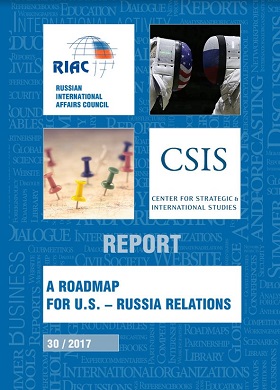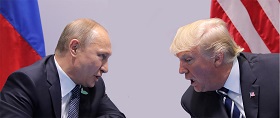Five Questions that Need to be Addressed about American Foreign Policy
(votes: 12, rating: 4.58) |
(12 votes) |
PhD Candidate in Middle Eastern & African History at Tel Aviv University and a Junior Editor for Global Brief Magazine
The discussion in the United States since the election of Donald Trump has focused on how Russia interfered, colluded or meddled in the 2016 US Presidential Election. The news anchors and pundits in the United States have accepted it as fact that there was interference. Despite a lack of substantial proof, this is preventing an honest discussion of what is most important: America’s current foreign policy and the danger it poses to itself and the international community.
To examine America’s foreign policy, it is worth taking a look at what issues candidate Donald Trump raised during his presidential campaign. This is not to condone Donald Trump and his presidency, but rather an attempt to raise awareness of the dangers America’s foreign policy poses to itself and the international community. During his campaign, candidate Trump informally asked five fundamental questions that many people have been asking and wondering about for quite some time. The public might have not liked his answers, but the questions he posed should be taken seriously. As a refresher, the five fundamental questions were as follows:
- Why must the U.S. play the role of the world’s policeman on the international stage?
- What is the North Atlantic Treaty Organization’s (NATO) mission? Is it fighting terrorism? Is it obsolete?
- Why does the U.S. always pursue a policy of ‘regime change’?
- Why is Russia (and its president, Vladimir Putin) treated as an enemy when it should be treated as a partner?
- Should U.S. Nuclear Policy allow a ‘first strike’?
Liberals and Conservatives in America alike want to get rid of Donald Trump, but that will not solve the problem. If these foreign policy questions are not urgently addressed and altered, “Trumpism” and the extreme right-wing political trend will remain and become louder after he leaves office. Do America and the world really want to go down that path?
The discussion in the United States since the election of Donald Trump has focused on how Russia interfered, colluded or meddled in the 2016 US Presidential Election. The news anchors and pundits in the United States have accepted it as fact that there was interference. Despite a lack of substantial proof, this is preventing an honest discussion of what is most important: America’s current foreign policy and the danger it poses to itself and the international community.
To examine America’s foreign policy, it is worth taking a look at what issues candidate Donald Trump raised during his presidential campaign. This is not to condone Donald Trump and his presidency, but rather an attempt to raise awareness of the dangers America’s foreign policy poses to itself and the international community. During his campaign, candidate Trump informally asked five fundamental questions that many people have been asking and wondering about for quite some time. The public might have not liked his answers, but the questions he posed should be taken seriously. As a refresher, the five fundamental questions were as follows:
- Why must the U.S. play the role of the world’s policeman on the international stage?
- What is the North Atlantic Treaty Organization’s (NATO) mission? Is it fighting terrorism? Is it obsolete?
- Why does the U.S. always pursue a policy of ‘regime change’?
- Why is Russia (and its president, Vladimir Putin) treated as an enemy when it should be treated as a partner?
- Should U.S. Nuclear Policy allow a ‘first strike’?
The United States as “Policeman”
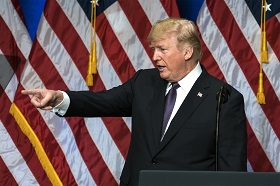
Is America First?
For many decades, the United States has been playing policeman in the world and causing much harm to local populations. These problems continue to plague many countries’ internal politics. Following the Second World War, the United States’ foreign policy was to ensure that American-style capitalistic “democracy” was promoted wherever this was in its national interest. This was one reason behind many of the proxy wars that took place throughout the decades.
When Ronald Reagan and Mikhail Gorbachev thought that they had ended the Cold War in the 20th century, the Americans interpreted that they had “won” and the Soviet Union had lost. Thus, successive administrations pursued a foreign policy of ensuring “freedom and democracy” for countries throughout the globe—even if they were not ready for that type of governance. In essence, America was acting as a hegemonic power and doing as it pleased. We have seen this in continuous American covert or overt interventions in the Middle East, in the Caucuses, South America, and many other parts of the world.
American foreign policy promotes policing the international community to minimize human rights violations. They do so when that is expedient to their national interests. For example, America dragged its feet on the Rwandan genocide, yet overreacted in Serbia. In both instances, its actions had a detrimental effect on long-term stability. We will revisit the Serbian case later on.
In other instances, the United States attempted to control certain narratives by imposing sanctions upon countries that committed what it claimed were violations. We saw this most recently in 2014, when Russia accepted the Crimean plebiscite to join Russia. At the time, Barack Obama sanctimoniously imposed sanctions on Russia because, in his judgment, it was unacceptable that one country annex a part of another country. We must remember that, over a century ago, the United States seized eastern Cuba (Guantanamo) by force, claiming that it was “liberating” Cuba. Guantanamo is still under American control, even though Cuba gained independence over half a century ago. Guantanamo was always Cuba’s main port for trade with Europe, which is vital for Cuban imports and exports. While this was some time ago, it still makes it hypocritical for the United States to suggest that the annexation (or reunification) of Crimea is “illegal.”
Recently, the United States has accused Russia of interfering in its 2016 presidential elections. However, let’s quickly look at where the United States actually interfered in other countries’ elections. We can go back to 1996 when the Americans openly helped elect Boris Yeltsin become President of Russia even though he actually lost the election to Gennady Zyuganov. The American meddling was so blatant that the movie Spinning Boris was released in 2003 based on this incident. More recently, in 2009, the Obama administration played a key role in an illegal coup in Honduras. There are other instances, but that would require several books.
Neither “freedom” nor “democracy” played a part in these interventions. The United States was simply interested in expanding its sphere of influence and ensuring that its national interests were preserved. It tried to introduce democracy to countries that were either ill-prepared or uninterested in Western democratic principles. America tends to “cherry-pick” when it comes to policing human rights violations. It acts when it perceives that action is in its national interest. By acting as “policeman,” its foreign policy has created some of the instability that we are seeing today.
NATO’s Mission
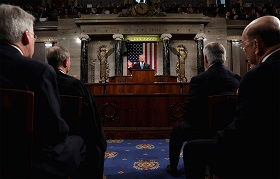
Russian Approaches to the United States: Algorithm Change Is Overdue
During the 2016 US Presidential Elections, Donald Trump consistently questioned NATO’s mission. He asked if it was obsolete and wondered if it was really fighting terrorism. He also lambasted NATO members for not paying the required 2% of their defense budget while the United States did all the heavy lifting. Regarding the latter, he was only reiterating what President Obama had been lamenting for years during his presidency. However, where Donald Trump differed from his predecessor was that he did not mind if the lack of payment from member states led to the break-up of NATO. His question regarding NATO’s purpose is valid. Sadly, we never got to hear any in-depth discussion regarding the issue.
NATO has been ambiguous—especially after the break-up of the Soviet Union. Feeling that the continent could be vulnerable to an attack from the Soviet Union after World War II, some European countries, along with the Americans, created a security alliance with the sole purpose of defending member states in the event that the Soviet Union might attack those countries. Fast-forwarding to the end of the Cold War, George H.W. Bush and Mikhail Gorbachev negotiated an oral agreement that if Germany were to reunify and join NATO, the alliance would move “not one inch eastward” toward Russia’s borders. That promise was not only broken, it was demolished. The number of NATO member-states has swelled and has become the greatest military force in modern peacetime history. NATO’s expansion eastward has led it all the way to Russia’s borders by land, sea, and air. NATO claims that it is fighting terrorism, but almost never does. Rather, NATO is used to deter “Russian aggression” when the “aggression” is in response to NATO’s own aggression towards Russia. For instance, on Russia’s western border—along the Baltic Sea—there are more than 300,000 NATO troops on high alert and NATO is ramping up deployment and exercises on a daily basis.
NATO has aided and abetted in America’s unilateral approach to the international order in the post-Cold War era. The best example is in the case of Serbia in the late 1990s. When it was said that Slobodan Milosevic was committing war crimes while preventing the Kosovans from gaining independence, the United States bombed Milosevic’s forces using NATO ones, in hopes that it would lead to the withdrawal of Milosevic’s forces from Kosovo. In other words, NATO and the United States took a unilateral approach to ensure that Kosovo would gain its independence from Serbia. Today, Kosovo is an independent country that is, for all intents and purposes, a NATO protectorate and, more importantly, a leading country in organ trafficking. Also, there is a double standard coming from America (and the European Union). When Catalonia recently voted to gain independence, it was deemed illegal—a completely different view from the United States and its European allies.
While there might have been war crimes committed in Serbia, there was an alternative way of dealing with the crisis. It could have been coordinated and cooperated on with Russia to solve the problem. After all, Serbia is in its neighbourhood and they both share cultural and religious similarities. During that period, under Boris Yeltsin, Russia was in the mood to help America and would have tried to help resolve the issue. After all, America and Russia were on friendlier terms. Sadly, the Americans did not use Russia’s help to solve the problem, which deeply angered the Kremlin and the Russian people. (On his way to Washington, after learning of the NATO bombing, Russian Prime Minister Yevgeny Primakov returned to Moscow in mid-flight.) For Russians, this was like seeing a brother being slaughtered and being unable to do anything about it.
In essence, since the breakup of the Soviet Union, NATO has been operating without a cause. It says that it is fighting terrorism, but terrorism it is still as rampant today as it was when NATO made its declaration—and the terrorists are still on the march. In reality, the majority of the time, it seems like NATO is more interested in deterring Russia, as it accepts new members along Russia’s borders who have longstanding historical grievances with Russia. Some might argue that if a country wants to join NATO, it has the right to do so. But while the following might sound like heresy, a country should not be allowed to join NATO just because it feels like it. As one esteemed Russian expert put it, “NATO is not a non-selective fraternity or the AARP. It is a security organization whose sole criterion for membership should be whether or not membership enhances the security of its members.” It is safe to say that these members today are less safe as a result of the expansion of NATO. Whatever the international community thinks about Russia or its current President, it is worth revisiting the usefulness of this alliance. For the moment, NATO seems to be part of the problem, not the solution.
To ‘Regime Change’ or not ‘Regime Change,’ that is the question
When Donald Trump said that he thought that Syrian President Bashar al-Assad should remain as President of Syria until the terrorists were defeated, he touched a nerve in the American foreign policy establishment. That’s because, up until the 2016 US Presidential Election, the United States has long been, in some manner or another, performing a foreign policy of ‘regime change,’ and the American foreign policy establishment was scared that a future President Trump would reverse it. The foreign policy establishment has pushed this policy on a regular basis in countries around the world—namely in the Middle East as well as in Eastern Europe and the Caucuses—under the disguise of promoting and bringing Western-style liberal democracy into the countries within those regions. In nearly all instances, it has proved to be a disastrous policy, as many had predicted even before the crusade began.
In the Middle East, it is well known that America wanted to remove the dictators of certain countries to bring “freedom and democracy” to them. For instance, in Iraq, the George W. Bush administration wanted to remove Iraqi President Saddam Hussein on grounds that he possessed Weapons of Mass Destruction (WMDs) and that he had close ties with Al-Qaeda. In its estimation, based on those allegations, it felt that it needed to act urgently, against international law, to remove him from power. Both those accusations ended up being false. However, the damage had been done, as the United States and its “coalition of the willing” unilaterally invaded Iraq and removed its president. Today, the country is in complete disarray and is a haven for jihadi militias and terrorism. The same can be said of other countries in the Middle East, including Libya and Syria. Libya is another haven for terrorism after NATO forces assisted in killing former Libyan President Muammar Gadhafi. And in the case of Syria, if it were not for Russia’s intervention, Syrian President Bashar al-Assad would have had the same fate as Gadhafi. This is not to advocate for the dictators in power, but rather to demonstrate the thought process of the United States foreign policy class (with assistance from the Israelis) and its lack of knowledge about the region.
In regards to the so-called “color revolutions,” the same powerful figures in the United States’ foreign policy apparatus have continuously supported “color revolutions” in Eastern Europe—namely in Georgia and Ukraine. Leaving aside that Georgia and Ukraine have long been on NATO’s radar for membership (former U.S. President George W. Bush openly made that promise to both countries), these powerful foreign policy figures again did not (and maybe still do not) understand the consequences of supporting a revolution that can have potent implications and disastrous outcomes for the countries involved and for the international community. In both cases, the United States meddled in the countries’ affairs to ensure all the tools were in place for them to be ripe to join NATO. However, it did not take into account (or did not want to take into account) that, in both instances, Russia would intervene, because for Russia both those countries were “red lines.” Russia deems that NATO is a national security threat, given NATO’s military capability. Both Georgia and Ukraine are right on Russia’s border and having NATO on its border was a “red line.” It is as if the American foreign policy class does not believe Russia is entitled to have its own national security concerns. Maybe the foreign policy class should ask a simple question: what would America do if a military force not seen since World War II was approaching its borders en masse in, say, Canada? Any honest person would answer that America would probably do the same as Russia. Nevertheless, it should also be noted that neither Georgia nor Ukraine are bastions of Western liberal democracy—something that the American foreign policy establishment frequently claim them to be.
Is Russia a partner or an adversary?
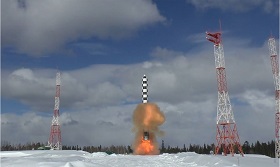
Strategic Stabilization: A Window of Opportunities for Russia and the U.S.
Another question that Donald Trump literally asked throughout the campaign was, “wouldn’t it be great if we could get along with Russia?” Sadly, instead of asking why he thought “it would be great to get along with Russia,” everyone chastised him and accused him of being some sort of “Kremlin agent,” “Putin puppet,” “Putin’s useful idiot,” or—even worse—“the Manchurian candidate.” Let us be clear, Donald Trump is dangerous in many ways, but he asked a question that was worth asking, because relations between the two countries are lower that at any point during the Cold War. That is not good for two nuclear superpowers, especially since there are many hotspots in this exceedingly more dangerous “New Cold War” between Russia and the United States. Specifically, in Ukraine (the epicenter), in Syria and the Middle East, and on the sites of NATO expansion along Russia’s borders—namely in the Baltic States, where there is daily NATO military build-up and exercises. Any mishap in one of those hot spots could lead to war, and potentially to nuclear war, between the two countries.
However, there are many areas where Russia could help the United States and other countries. Namely, it could help in nuclear non-proliferation, combatting international terrorism, the fight against global warming or climate change, global income inequality, cyber security, and many other important issues of national security. However, for all this to take place, the furor in the political arena needs to veer away from Russia (or Russians) and Vladimir Putin being considered bad words. These days, anytime someone speaks to a Russian (let alone someone from the Kremlin), it is seen as speaking to the enemy and deemed treasonous. Also, the Russophobia and xenophobic attacks need to stop. The general consensus today is that Russians are, as former NSA Director James Clapper said, “typically, almost genetically driven to co-opt, penetrate, gain favour.” Leaving aside what former CIA Director John Brennan warned to the American people about having Russian contacts, this sounds awfully similar to a dark period in America’s history—the McCarthy era of the 1950s, during the Second Red Scare (commonly known as “McCarthyism”), when Republican Sen. Joseph McCarthy was on a witch-hunt for anyone in America with “Communist ties.” Once a suspicion was detected, the accused would be brought to the House Un-American Activities Committee (HUAC) in Congress. The charged would be publicly humiliated. As a result, many people’s lives were ruined and some never fully recovered.
The “McCarthyism” in this New Cold War is worse than in the preceding one because the preceding one was narrow and only dealt with political affiliation. This one is obsessed with anybody who might be under Russian influence of any kind. If someone has a profound affinity for Russian culture and for Russian history, he or she might be deemed a “Kremlin agent,” which is something new that was never practiced in the preceding Cold War. When you continuously accuse a politician, an academic, or anyone else of being a “Kremlin agent,” it becomes commonplace. Thus, those that are “Russia-watchers,” Russian scholars, or simply individuals who have an affinity for Russia are disgraced.
This Russiagate story has become a national security threat to the United States and the international community. With no actual evidence, Russiagate (aided and abetted by the mainstream media) has become a primetime issue in American politics and academia. Anyone seeking a conciliatory approach to resolving the tensions between the US and Russia has also been slandered as Putin’s “friend,” his “puppet,” or other ludicrous and insulting accusations. This activity, whatever one wants to call it, is damaging any chance to have better relations with Russia. No one has put anyone else in the White House or the Kremlin. As much as the international community despises the leaders of these two countries, the Presidents need to talk and sort out the contentious issues that have soured the relationship—without the slander. Not to scare anyone, but the Bulletin of the Atomic Scientists readjusted its “Doomsday” clock (midnight indicating nuclear apocalypse) to two minutes to midnight—something not seen since the early days of the first Cold War in the 20th century.
While we wish that Donald Trump were not the President of the United States, he has been elected, and he should be given the authority to negotiate with his Russian counterpart, like Democratic and Republican Presidents did before him, without slander. With all indications showing that we are in a similar situation to the 1962 Cuban Missile Crisis, it is worth revisiting it for just a second. Imagine if John F. Kennedy was President of the United States in today’s environment. He would have never been able to negotiate with Nikita Khrushchev to resolve the 1962 Cuban Missile Crisis and nuclear war would almost certainly become a reality.
America’s Nuclear Policy
On MSNBC, Chris Matthews asked candidate Donald Trump if he would ever use nuclear weapons. After being pressed several times, Trump thought about it for a bit and said, “no…I’m not taking any cards off the table.” He was lambasted for the comment. However, official American nuclear policy states that the United States does not take “first use” of nuclear weapons off the table. In other words, Trump reiterated, in his own way, what has been American policy for over 70 years. To be clear, Trump does raise the danger of nuclear confrontation in a way that most of his predecessors attempted to avoid. However, what occupied most of the media’s discussion was Trump’s psychological fitness to be President of the United States, when the media should have been discussing America’s nuclear policy. Sadly, we never saw that debate and the policy has remained the same.
It is high time for America to discuss this policy, given the toxic relationship with Russia and the increase of the number of nuclear states from two to nine since 1949. Former President George W. Bush’s autonomous withdrawal from the 1972 Anti-Ballistic Missile (ABM) Treaty in 2002 did not help. The ABM Treaty was a cornerstone of international security. Without this treaty to hold countries back, Russia started to rebuild and modernize its nuclear arsenal in order to hold off NATO and deter nuclear threats. Vladimir Putin said as much in the latter third of his recent address to the Federal Assembly in March, where he explained Russia’s upgraded nuclear arsenal in the hope that the two countries could sit down and talk. Given this proliferation of nuclear weapons, a partnership between the two countries would be important for the whole world.
The Cold War might have ended on paper in 1987, but the possibility of nuclear war never ended—and is more dangerous now than ever before. No President has ever been successful in reversing America’s nuclear policy of “first use.” Since President Reagan, no American President has been able to reduce the growing nuclear threat. President Obama tried to reverse the decades-old policy of “first use” but he received much opposition from his cabinet, his national security council, and also many European and Asian allies. Having said that, he could have chosen to override his dissenters but, in the end, chose not to do so. Ultimately, Obama did not try hard enough, because he did this far too late in his presidency. In late 2015, he approved advancements in America’s nuclear arsenal by allowing new nuclear delivery systems, updated warheads, robust command networks, and industrial sites for fabricating nuclear equipment. Also, in early 2016, he modernized and improved America’s nuclear arsenal by miniaturizing its size and making the arsenal more precise without reducing the lethality of the weapons. Essentially, Obama gave lip service to a “nuclear-free world” throughout his 2008 campaign and his two terms as President, but that never came to fruition, part in parcel because he did not try hard enough. Now the current president has continued in Obama’s footsteps and made America’s nuclear policy more dangerous.
As Adam Shatz correctly points out in the London Review of Books, “perhaps the question we should be asking is not whether Trump can be stopped, but whether the system as a whole can be overhauled.” Indeed, since President Franklin D. Roosevelt, the American government has consistently increased its President’s power to be the sole rational decider of the most irrational decision one can make: whether a nuclear launch is necessary. Just to get the idea, during the Second World War, President Franklin Roosevelt was already concerned with how much power was invested into the Presidency of the United States. He promised that once the war was over, “(the) powers under which (he acted) automatically (would be reverted) to the people—to whom they belong.” It is unknown whether he would have acted upon that promise, but that quote should give the reader an idea of how concentrated the powers of the Presidency were with regards to nuclear weapons. It has been over 75 years since Roosevelt made that statement, and the nuclear threat is just as dangerous now (if not even graver) than it was when he uttered those words; the President has the same (if not more) power to press the nuclear button—obliterating the planet in roughly twenty to thirty minutes.
Conclusion
These questions that Donald Trump raised in the 2016 US Presidential Elections were long overdue questions that needed (and still need) urgent answers. Instead of having a debate, critics responded with slander and, even worse, a sort of censorship on any dissent, which exists to this day. For a country like America, which prides itself on freedom, Western liberalism, and democracy, one would expect that it would practice what it preaches.
It is high time that these questions be answered and discussed, because America has extended itself a bit too far as the policeman of the world practicing a policy of ‘regime change’ for several decades. As a result, an exorbitant amount of money has been spent on its military and rebuilding countries into democracies, when that money could be used to fix the many desperate problems its own country is suffering from. That is one of the main reasons why America elected Barack Obama and Donald Trump (not John McCain, Mitt Romney, and Hillary Clinton) who both promised, in their own way, to look after “The Forgotten Man.” The NATO and Russia questions should be debated extensively because, the former question is a major reason for the tensions revolving around the latter question. In addition, both NATO and poor relations with Russia are threatening America’s national security as well as the international community’s national security. Certainly, Russia being America’s partner rather than adversary would help America and the international community on issues of national security. More importantly, better relations with Russia could help defuse the last topic Donald Trump informally raised: nuclear proliferation (or, at the very least, significantly reduce the quantity of nuclear weapons). With America and Russia in possession of over 90% of the available nuclear arsenal, cooperation with Russia is not just advisable but rather imperative.
The purpose of raising the points Donald Trump brought up during his campaign is to begin the discussion that is so desperately needed. It is an effort to replace the recent discourse of hysteria—which is a national security threat in its own right—and censorship of dissent with a discussion about America’s foreign policy, which is making things more dangerous for Americans at home and abroad as well for the international community. Donald Trump is dangerous in many ways, but these problems existed before he was elected to office and will exist after he leaves office. The longer these questions are left untouched, the more problematic they will become to resolve—and it is extremely critical that they do get addressed sooner rather than later, given the dangers America and the international community are facing. Liberals and Conservatives in America alike want to get rid of Donald Trump, but that will not solve the problem. If these foreign policy questions are not urgently addressed and altered, “Trumpism” and the extreme right-wing political trend will remain and become louder after he leaves office. Do America and the world really want to go down that path?
Zach Battat is a PhD Candidate in Middle Eastern & African History at Tel Aviv University and a Junior Editor for Global Brief Magazine.
(votes: 12, rating: 4.58) |
(12 votes) |
A Report of the CSIS Russia and Eurasia Program and the Russian International Affairs Council
Is America First?How to build relations with the United States? Russia is not the only country asking itself this question
Russian Approaches to the United States: Algorithm Change Is OverdueThe former rebel and non-systemic candidate, a tireless fighter against the Washington establishment and the Deep State, in fact acknowledged his defeat. It's time to change Russia's tactics toward Washington
US Nuclear Policy UpgradedThe USA continues to move towards the reinstatement of nuclear weapons as a fundamental element of national and international security
Disillusionment and Missed Opportunities: Russia-U.S. Relations in 2017Russia made at least three tactical mistakes after the new Republican administration came to power
Strategic Stabilization: A Window of Opportunities for Russia and the U.S.Despite the belligerent nuclear statements by Russia and the U.S., the configuration of a possible future for the international arms control regimes can be seen beyond the veil of rhetoric.


